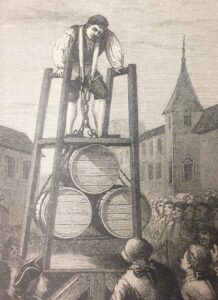POSTPONED due to inclement weather;
rescheduled for March 24
————————————————
3 February 2023 — 12:00 noon — GAR 4.100
Jan Todd (UT)
“The Scientist and the Strongman: John Theophilus Desaguliers, Thomas Topham, and the Early Search for the Limits of Human Strength”
J. T. Desaguliers (1683–1744) was a Fellow of the Royal Society of London and a leading early popularizer of Newtonian science. In the 1710s he became fascinated with the question of human strength when he saw a German strongman performing some lifts that looked to him as if they were mechanically aided, fakery that he described at a Royal Society meeting. In 1733, Desaguliers brought the strongman Thomas Topham to a meeting of the Society. Topham had true strength and this “show and tell” event is recorded in the minutes of the Society. Desaguliers’s interest in strength also led him to invent one of the earliest dynamometers, an important instrument for measuring force.
Society of London and a leading early popularizer of Newtonian science. In the 1710s he became fascinated with the question of human strength when he saw a German strongman performing some lifts that looked to him as if they were mechanically aided, fakery that he described at a Royal Society meeting. In 1733, Desaguliers brought the strongman Thomas Topham to a meeting of the Society. Topham had true strength and this “show and tell” event is recorded in the minutes of the Society. Desaguliers’s interest in strength also led him to invent one of the earliest dynamometers, an important instrument for measuring force.
_____________________
Professor Jan Todd directs the Physical Culture and Sport Studies Doctoral Program in UT’s Department of Kinesiology and Health Education. She is also the founder (with her late husband Terry Todd) of the H. J. Lutcher Stark Center for Physical Culture and Sports and serves as its director. Todd’s research examines the history of exercise and body culture with a special emphasis on the history of strength and sports medicine. Her most recent book is Strength Coaching in America: A History of the Innovation that Transformed Sports (UT Press, 2019; coauthored with Jason Shurley and Terry Todd).